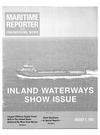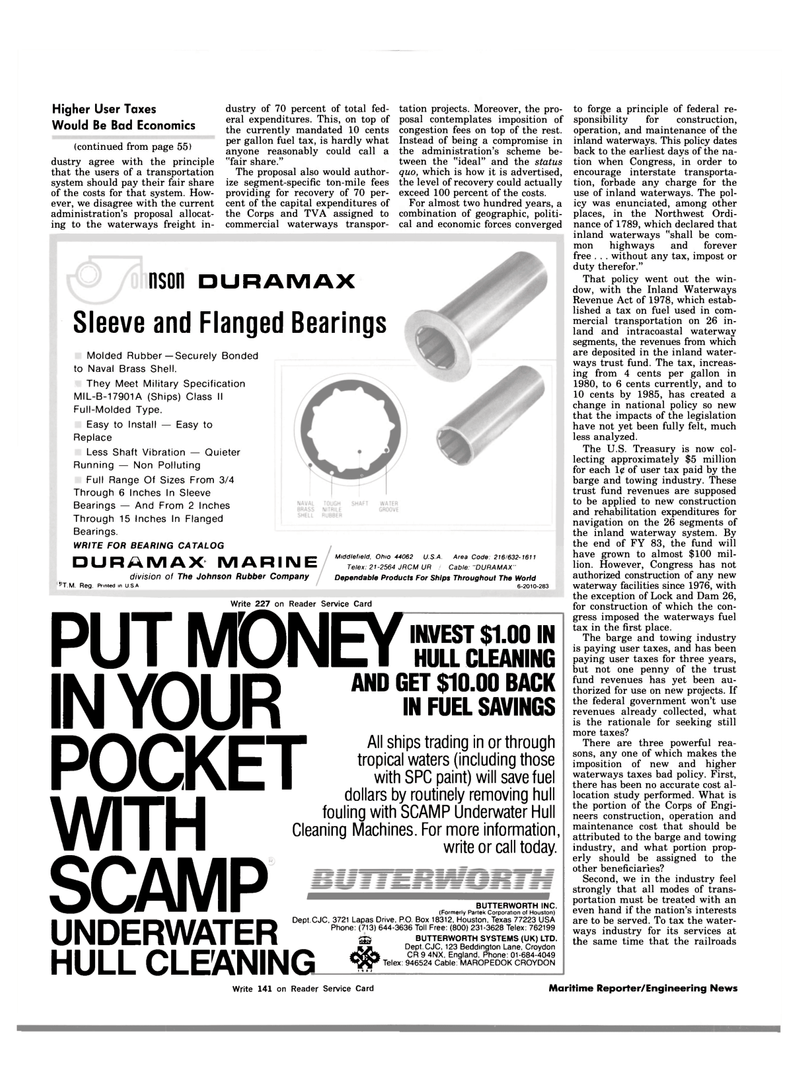
Page 56: of Maritime Reporter Magazine (August 1983)
Read this page in Pdf, Flash or Html5 edition of August 1983 Maritime Reporter Magazine
Higher User Taxes
Would Be Bad Economics (continued from page 55) dustry agree with the principle that the users of a transportation system should pay their fair share of the costs for that system. How- ever, we disagree with the current administration's proposal allocat- ing to the waterways freight in- dustry of 70 percent of total fed- eral expenditures. This, on top of the currently mandated 10 cents per gallon fuel tax, is hardly what anyone reasonably could call a "fair share."
The proposal also would author- ize segment-specific ton-mile fees providing for recovery of 70 per- cent of the capital expenditures of the Corps and TVA assigned to commercial waterways transpor- tation projects. Moreover, the pro- posal contemplates imposition of congestion fees on top of the rest.
Instead of being a compromise in the administration's scheme be- tween the "ideal" and the status quo, which is how it is advertised, the level of recovery could actually exceed 100 percent of the costs.
For almost two hundred years, a combination of geographic, politi- cal and economic forces converged nson OURAMAX
Sleeve and Flanged Bearings
Molded Rubber—Securely Bonded to Naval Brass Shell.
They Meet Military Specification
MIL-B-17901A (Ships) Class II
Full-Molded Type.
Easy to Install — Easy to
Replace
Less Shaft Vibration — Quieter
Running — Non Polluting
Full Range Of Sizes From 3/4
Through 6 Inches In Sleeve
Bearings — And From 2 Inches
Through 15 Inches In Flanged
Bearings.
WRITE FOR BEARING CATALOG
DURAMAX MARINE division of The Johnson Rubber Company ^T. M. Reg. Printed in U S A
Middlefield, Ohio 44062 U.S.A Area Code 216/632-1611
Telex: 21-2564 JRCM UR / Cable: "DURAMAX"
Dependable Products For Ships Throughout The World 6-2010-283
Write 227 on Reader Service Card PUT MONEY
IN YOUR POCKET
WITH SCAMP
INVEST $1.00 IN
HULL CLEANING
AND GET $10.00 BACK
IN FUEL SAVINGS
All ships trading in or through tropical waters (including those with SPC paint) will save fuel dollars by routinely removing hull fouling with SCAMP Underwater Hull
Cleaning Machines. For more information, write or call today.
UNDERWATER HULL CLEANING #
BUTTERWORTH INC. (Formerly Partek Corporation of Houston)
Dept.CJC, 3721 Lapas Drive, P.O Box 18312, Houston, Texas 77223 USA
Phone: (713) 644-3636 Toll Free: (800) 231-3628 Telex: 762199 <£} BUTTERWORTH SYSTEMS (UK) LTD.
Dept.CJC, 123 Beddington Lane, Croydon
CR 9 4NX, England, Phone: 01-684-4049
Telex: 946524 Cable: MAROPEDOK CROYDON to forge a principle of federal re- sponsibility for construction, operation, and maintenance of the inland waterways. This policy dates back to the earliest days of the na- tion when Congress, in order to encourage interstate transporta- tion, forbade any charge for the use of inland waterways. The pol- icy was enunciated, among other places, in the Northwest Ordi- nance of 1789, which declared that inland waterways "shall be com- mon highways and forever free . . . without any tax, impost or duty therefor."
That policy went out the win- dow, with the Inland Waterways
Revenue Act of 1978, which estab- lished a tax on fuel used in com- mercial transportation on 26 in- land and intracoastal waterway segments, the revenues from which are deposited in the inland water- ways trust fund. The tax, increas- ing from 4 cents per gallon in 1980, to 6 cents currently, and to 10 cents by 1985, has created a change in national policy so new that the impacts of the legislation have not yet been fully felt, much less analyzed.
The U.S. Treasury is now col-
lecting approximately $5 million
for each 1 The barge and towing industry
is paying user taxes, and has been
paying user taxes for three years,
but not one penny of the trust
fund revenues has yet been au-
thorized for use on new projects. If
the federal government won't use
revenues already collected, what
is the rationale for seeking still
more taxes?
There are three powerful rea-
sons, any one of which makes the
imposition of new and higher
waterways taxes bad policy. First,
there has been no accurate cost al-
location study performed. What is
the portion of the Corps of Engi-
neers construction, operation and
maintenance cost that should be
attributed to the barge and towing
industry, and what portion prop-
erly should be assigned to the
other beneficiaries?
Second, we in the industry feel
strongly that all modes of trans-
portation must be treated with an
even hand if the nation's interests
are to be served. To tax the water-
ways industry for its services at
the same time that the railroads
Write 141 on Reader Service Card Maritime Reporter/Engineering News

 55
55

 57
57
